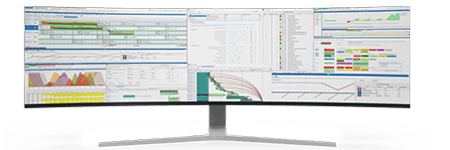
Matching Demand and Supply: A Strategic Framework for Industrial Manufacturing
Matching demand with supply has become a sophisticated balancing act in industrial manufacturing. Market uncertainties, complex supply chains, and increasing customer expectations add layers of complexity to the task. For Supply Chain Managers, this challenge demands not just strategic foresight but also cutting-edge tools to optimize decision-making.
One such solution lies in leveraging advanced planning and scheduling (APS) systems like PlanetTogether, seamlessly integrated with enterprise resource planning (ERP) systems such as SAP, Oracle, Microsoft Dynamics, Kinaxis, or Aveva. This powerful combination bridges the gap between demand signals and supply capabilities, fostering a more agile and efficient supply chain.

Matching Demand and Supply
Supply Chain Managers in industrial manufacturing face a host of obstacles when aligning production capabilities with customer demand:
Demand Volatility: Fluctuations in customer orders, seasonal trends, and market disruptions make demand unpredictable.
Global Supply Chains: Sourcing raw materials and managing logistics across borders adds complexity and risk.
Resource Constraints: Limited machine capacity, labor availability, and supplier capabilities can hinder supply fulfillment.
Data Silos: Lack of integration between planning tools and ERP systems leads to inefficiencies and blind spots.
To overcome these challenges, manufacturers need robust systems that provide real-time visibility, predictive capabilities, and synchronized planning across all supply chain nodes.


Why Integration Matters: PlanetTogether and Leading ERP Systems
Integrating PlanetTogether with ERP systems like SAP, Oracle, Microsoft Dynamics, Kinaxis, or Aveva offers a unified platform to manage the entire supply chain. Here’s how this integration transforms demand-supply alignment:
End-to-End Visibility
Integration ensures that data flows seamlessly between systems, providing a single source of truth for demand forecasts, production schedules, inventory levels, and supplier performance. This real-time visibility enables Supply Chain Managers to make informed decisions quickly.
Dynamic Production Scheduling
PlanetTogether’s APS system excels in creating optimized production schedules based on real-time data. When integrated with an ERP like SAP, the schedules can automatically adjust to reflect updated demand forecasts, machine downtimes, or material delays.
Scenario Planning and Simulations
By connecting PlanetTogether with advanced systems like Kinaxis, Supply Chain Managers can simulate various scenarios—such as demand surges or supply chain disruptions—to evaluate their impact on production. This capability enhances agility in responding to unexpected changes.
Inventory Optimization
Integration allows manufacturers to align inventory levels with actual demand patterns. For example, Aveva’s predictive analytics capabilities, when paired with PlanetTogether, can forecast inventory requirements and minimize excess stock, reducing carrying costs.
Collaborative Planning
Oracle’s robust cloud-based planning tools, combined with PlanetTogether’s APS capabilities, foster collaboration across departments. This ensures that sales, operations, and procurement teams are aligned, leading to more accurate demand and supply planning.

Best Practices for Matching Demand and Supply
Achieving demand-supply balance requires more than technology; it requires strategic alignment and process excellence. Below are some best practices Supply Chain Managers should follow:
Enhance Forecast Accuracy
Use integrated systems to consolidate demand signals from multiple sources, such as customer orders, historical sales data, and market trends.
Incorporate advanced analytics tools within PlanetTogether and ERP systems to improve forecast accuracy.
Adopt Lean Principles
Eliminate waste in inventory, production processes, and transportation.
Leverage PlanetTogether’s scheduling tools to optimize production runs and reduce downtime.
Strengthen Supplier Collaboration
Use integrated platforms to share demand forecasts and inventory data with suppliers in real-time.
Partner with key suppliers to build resilience against disruptions.
Implement Real-Time Monitoring
Monitor supply chain performance using dashboards within ERP systems like Microsoft Dynamics.
Use PlanetTogether to identify and resolve bottlenecks proactively.
Leverage AI and Machine Learning
Employ predictive analytics in systems like Kinaxis to forecast potential disruptions.
Use PlanetTogether’s AI-driven optimization tools to adjust production schedules dynamically.
For Supply Chain Managers in industrial manufacturing, matching demand with supply is a complex but essential task. Integration between PlanetTogether and leading ERP systems such as SAP, Oracle, Microsoft Dynamics, Kinaxis, or Aveva provides the tools and visibility needed to tackle this challenge effectively.
By leveraging these integrated solutions, manufacturers can achieve a more agile, responsive, and efficient supply chain. The result is not just cost savings and operational efficiency but also a stronger ability to meet customer expectations and thrive in a competitive market.
Are you ready to take your manufacturing operations to the next level? Contact us today to learn more about how PlanetTogether can help you achieve your goals and drive success in your industry.